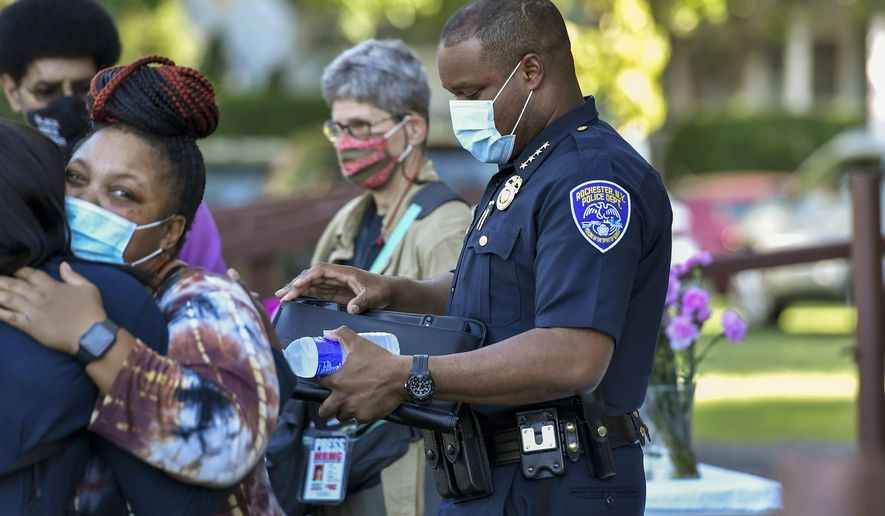Top police leaders in Rochester, New York, announced their retirements Tuesday amid nightly protests over the handling of the suffocation death of Daniel Prude, whose family filed a federal lawsuit alleging a cover-up by law enforcement.
Police Chief La’Ron Singletary, Deputy Chief Joseph M. Morabito and two commanders retired, while two more deputy chiefs and a commander gave up top leadership positions and returned to lower ranks. The outgoing chief accused critics of trying to “destroy my character and integrity.”
Mayor Lovely Warren said during a video call with members of the City Council that she did not ask Singletary, 40, to resign, but that his abrupt decision to step down came after “new information that was brought to light today that I had not previously seen before.” She did not elaborate.
While the “timing and tenor” of the retirements were difficult, Warren said later at a brief news conference, “I truly believe that we will get through this.”
The sudden announcements came more than five months after the death of Prude, a 41-year-old Black man who died several days after an encounter with police March 23 in New York’s third-largest city. There have been nightly protests in the city since the video’s release Wednesday.
“The events that have unfolded today have taken us completely by surprise, as they have everyone else,” the Rochester police union, known as the Locust Club, said in a prepared statement. The union blamed the “problems of leadership” on the mayor.
“The members of the Rochester Police Department and the Greater Rochester Community know my reputation and know what I stand for,” Singletary said in his own prepared statement. “The mischaracterization and the politicization of the actions that I took after being informed of Mr. Prude’s death is not based on facts, and is not what I stand for.”
Singletary, who spent his entire career in the Rochester Police Department, was appointed chief in April 2019. He will stay on through the end of the month, Warren said. Both the mayor and Singletary are Black.
“This is great news,” said Iman Abid, speaking for Free the People ROC, which has held protests since details of Prude’s death emerged. “It says to the people that people are able to move things and to shape things. The police chief wouldn’t retire if it weren’t for something that he felt he was accountable to.”
But, she said, nightly protests will continue to push other demands, including the resignation of the mayor, defunding and demilitarizing of police, and development of a state law barring police departments from responding to mental health crises.
Officers found Prude running naked down the street in March, handcuffed him and put a hood over his head to stop him from spitting, then held him down for about two minutes until he stopped breathing. He died a week later after he was taken off life support.
His brother, Joe Prude, had called 911 seeking help for Daniel Prude’s unusual behavior. He had been taken to a hospital for a mental health evaluation earlier that night but was released after a few hours, his brother told officers.
His death sparked outrage after his relatives last week released police body camera video and written reports they obtained through a public records request.
Seven police officers were suspended a day later, and state Attorney General Letitia James said Saturday she would form a grand jury and conduct an “exhaustive investigation” into Prude’s death.
In a federal lawsuit filed Tuesday, Prude’s family alleged that it took more than 90 seconds for officers to notice he had stopped breathing because they were chatting and making jokes at his expense. Prude’s sister, Tameshay, sued as executor of his estate and named the city of Rochester, Singletary and officers involved in the arrest as defendants.
Prude’s family contends his death and a cover-up stem from longstanding police department policy and practice that “condones and encourages officers to use excessive force as a matter of course, and to lie in official police paperwork and sworn testimony to justify their unlawful actions.”
The lawsuit alleges the police department sought to cover up the true nature of Prude’s death, starting with what Warren said was Singletary reporting to her early on that Prude had an apparent drug overdose.
The lawsuit also argues officers used force against Prude at a time when he “obviously posed no threat to the safety of the officers or anyone else.”
“Mr. Prude was in the midst of an acute, manic, psychotic episode,” the lawsuit states. “Mr. Prude was unarmed, naked and suffering. He needed help.”
Police union officials have said the officers were following their training.




Please read our comment policy before commenting.